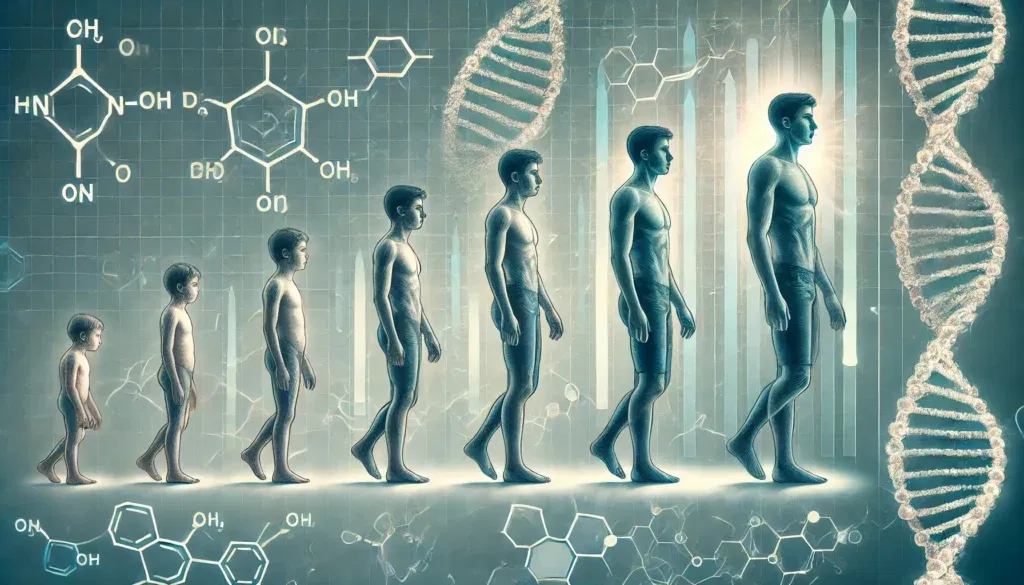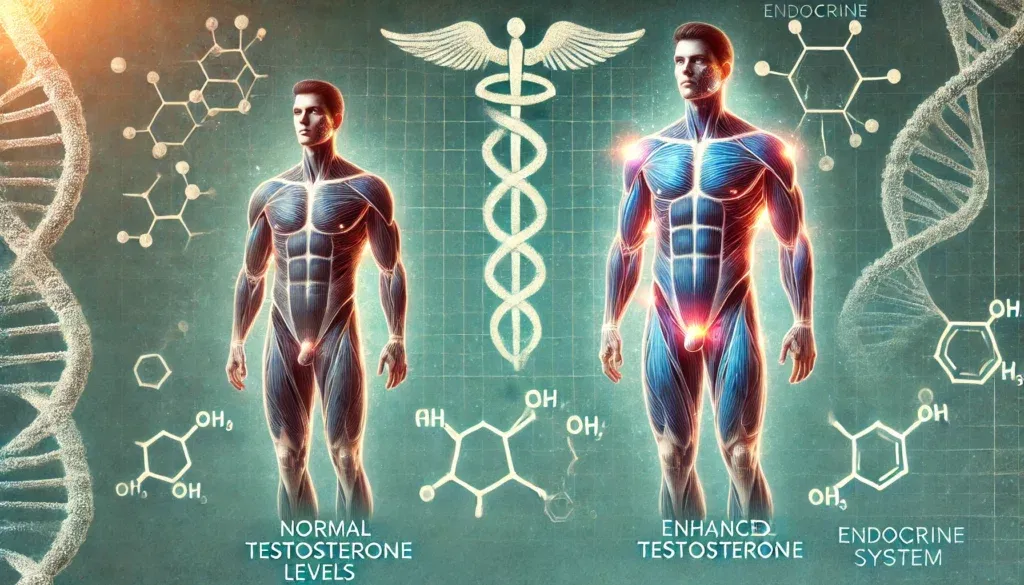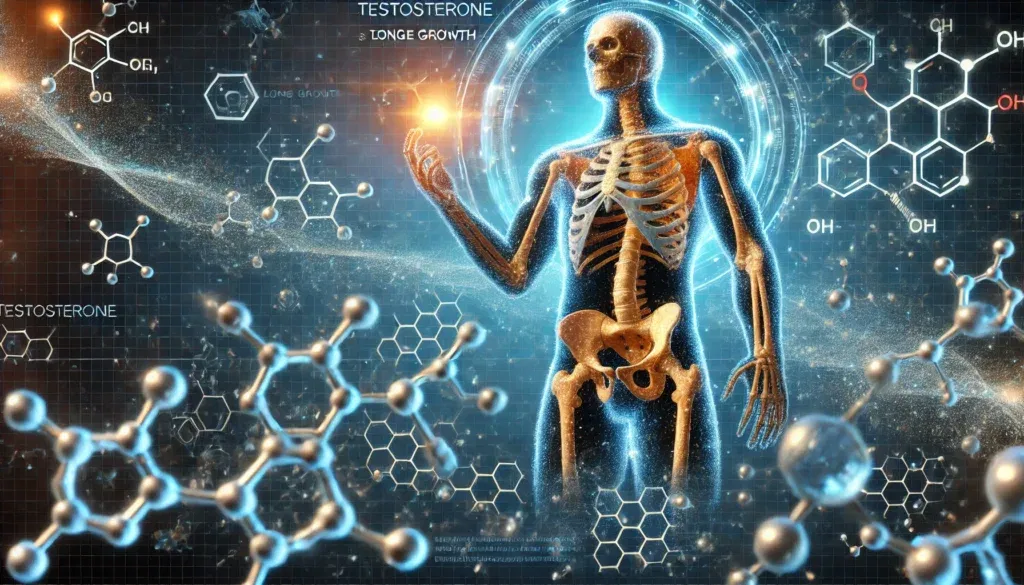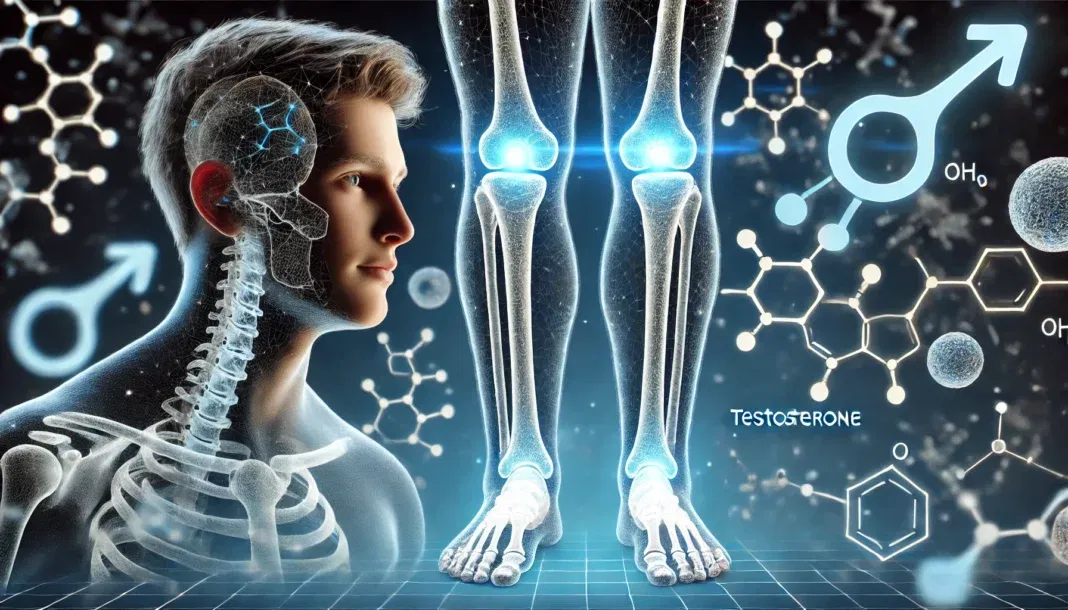Understanding the Role of Testosterone in Growth and Development
Testosterone is a vital hormone that influences many physiological processes, particularly those related to male puberty and development. It plays a crucial role in muscle growth, fat distribution, bone density, and even mood regulation. However, one of the most frequently asked questions is, “Does taking testosterone make you taller?” This question is particularly common among adolescents, athletes, and transgender men undergoing hormone replacement therapy (HRT).
You may also like: How to Increase Testosterone Levels Naturally: Science-Backed Strategies for Men’s Health & Longevity
The relationship between testosterone and height is complex, as multiple biological and environmental factors determine an individual’s final adult stature. While testosterone contributes to overall growth and development, particularly in males, it is not the primary determinant of height. Instead, height is largely influenced by genetics, growth hormone levels, and the timing of puberty. Testosterone interacts with these factors, but its effects on height are not as straightforward as some might assume.
In order to fully understand whether testosterone can make you taller, it is essential to explore how height is regulated, how testosterone affects growth plates, and whether taking testosterone supplements or undergoing HRT has a significant impact on stature. Additionally, distinguishing between pre-pubertal and post-pubertal testosterone exposure is crucial, as the timing of hormone administration plays a significant role in its effects on skeletal development.

The Biological Mechanisms of Growth: How Height Is Determined
Height is primarily dictated by genetic factors, which determine the potential range an individual may grow within. However, reaching one’s full height potential is influenced by hormones, nutrition, and overall health. The most critical hormone in height regulation is growth hormone (GH), which is secreted by the pituitary gland and stimulates the production of insulin-like growth factor 1 (IGF-1). IGF-1, in turn, promotes the elongation of long bones by acting on growth plates, the areas of developing cartilage located at the ends of bones.
Testosterone plays a supporting role in this process, as it contributes to the increase in IGF-1 levels and encourages bone mineralization and density. During puberty, rising testosterone levels, in conjunction with GH, spur the growth spurt that characterizes adolescent development. However, testosterone is also responsible for the eventual closure of the epiphyseal plates (growth plates), which marks the end of height increase.
When considering whether testosterone will make you taller, it is important to recognize that while testosterone supports growth during puberty, excessive or late-stage testosterone supplementation does not extend height. Once the growth plates close, no further elongation of bones is possible, regardless of testosterone levels.
Testosterone and Growth During Puberty
Testosterone has a profound effect on male puberty, where it contributes to increased muscle mass, deeper voice development, and secondary sexual characteristics. One of its key roles during this period is stimulating bone growth, particularly in the limbs. This is why many adolescent boys experience a dramatic height increase as testosterone levels surge. However, the growth spurt is temporary, and testosterone eventually signals the fusion of the epiphyseal plates, ceasing further growth.
The impact of testosterone on height is different in those who undergo puberty later or those who receive exogenous testosterone through medical treatment. Individuals with delayed puberty may be prescribed testosterone to help trigger the onset of puberty, potentially allowing them to catch up in height. However, once the growth plates close, additional testosterone supplementation will not contribute to height gain.
For transgender men undergoing testosterone therapy as part of their transition, the hormone will influence fat distribution, muscle mass, and voice deepening, but it will not increase height if therapy begins after the completion of puberty. This is a crucial distinction, as some mistakenly believe that testosterone therapy alone will result in additional height gain, which is not the case once bone growth has ceased.
Can Taking Testosterone Make You Taller? Examining HRT and Height
For individuals considering hormone replacement therapy (HRT), one of the most common questions is whether it will have an effect on height. The answer depends largely on the age at which testosterone therapy begins. If an individual starts testosterone therapy before their growth plates have fused, there may be some contribution to growth, particularly if they were experiencing a delay in puberty. However, if therapy is initiated post-puberty, height will remain unchanged.
In female-to-male (FTM) transgender individuals, testosterone therapy is often started in late adolescence or adulthood. By this time, most people have already completed their growth cycle, meaning that testosterone will have no impact on height. However, if an individual begins hormone therapy in their early teens, before growth plate closure, they may experience a growth spurt due to testosterone’s influence on bone elongation.
Similarly, individuals with conditions such as Klinefelter syndrome, which affects testosterone production, may receive testosterone therapy to aid in overall development. If started early enough, this can help promote normal pubertal growth, but it does not necessarily guarantee a height increase beyond genetic potential.
Will Testosterone Make Me Taller If Taken in Adulthood?
One of the most persistent myths is that taking testosterone in adulthood can lead to increased height. This misconception likely arises from testosterone’s known effects on muscle growth and body composition, which can give the illusion of increased stature. However, once an individual has reached skeletal maturity, additional testosterone will not cause the long bones to grow further.
In adults, testosterone can contribute to increased bone density and improved posture, which may make a person appear taller. Strengthening of the spinal column and better musculoskeletal support can improve the way a person carries themselves, leading to a slight boost in perceived height. However, this is not the same as actual bone growth.
Some bodybuilders and athletes use testosterone supplements to enhance their physique, but even at high doses, this does not translate to increased height. In fact, excessive testosterone use can lead to negative side effects such as joint issues and premature aging of bone tissue.
The Science Behind Growth Plate Closure and Height Limits
To fully understand whether testosterone makes you taller, it is essential to examine the process of growth plate closure. Growth plates are soft areas of developing cartilage that allow bones to elongate during childhood and adolescence. These plates remain open during early life, enabling height increases under the influence of growth hormone and IGF-1.
However, as puberty progresses, testosterone plays a key role in signaling these plates to close. This means that while testosterone initially stimulates height growth, it eventually acts as a limiting factor. Once these plates fuse, typically around ages 16 to 18 in males, no further height growth is possible, regardless of testosterone levels.
This is why testosterone therapy has no effect on height in post-pubertal individuals. Even if testosterone levels are increased significantly, the closed growth plates prevent any additional elongation of the bones.

Frequently Asked Questions (FAQ) About Testosterone and Height Growth
1. Does taking testosterone make you taller if you are already an adult?
No, once your growth plates (epiphyseal plates) have fused, typically in your late teens or early twenties, taking testosterone will not make you taller. Height is primarily determined by genetics and influenced by growth hormones, not just testosterone alone. While testosterone plays a role in growth during puberty, it does so indirectly by stimulating muscle and bone development. If your growth plates are still open, medical interventions such as growth hormone therapy, in combination with testosterone, may influence height. However, after bone fusion, the only way to increase height is through surgical limb-lengthening procedures.
2. Will testosterone make me taller if I start taking it during puberty?
Testosterone can contribute to growth during puberty, but it depends on individual factors such as genetics, overall hormone levels, and the timing of puberty. If testosterone levels are naturally low, hormone therapy might support normal growth, but it will not exceed your genetically predetermined height. Growth hormone, not just testosterone, is the primary driver of height increase. However, early exposure to high levels of testosterone can lead to premature closure of growth plates, potentially limiting final height. It is important to work with a medical professional before considering any hormone-based treatment for height concerns.
3. Can testosterone make you taller if you have a hormone deficiency?
Yes, if you have a testosterone deficiency or delayed puberty due to conditions like hypogonadism, medically supervised testosterone therapy may help you achieve your full genetic height potential. In these cases, testosterone can help with bone growth and overall development, but it must be prescribed and monitored by an endocrinologist. However, testosterone alone is usually not the only treatment—growth hormone therapy may also be necessary if the deficiency affects overall growth. If left untreated, a hormone deficiency during adolescence can result in shorter stature than genetically expected.
4. Does more testosterone make you taller if you already have normal levels?
No, increasing testosterone levels beyond what your body naturally produces will not make you taller once you have reached adulthood. While testosterone contributes to bone health and density, excessive levels do not extend the length of bones. In fact, artificially increasing testosterone during adolescence without medical supervision can lead to early closure of growth plates, reducing final height. Overuse of testosterone or anabolic steroids can also lead to other health issues, such as cardiovascular problems, mood disorders, and hormonal imbalances.
5. Will testosterone make me taller FTM (female-to-male transition)?
Testosterone therapy for FTM (female-to-male) transgender individuals does not directly increase height, especially if they have already completed puberty before starting hormone therapy. Height is determined during puberty, and if growth plates have closed, no amount of testosterone will increase bone length. However, testosterone can lead to changes in body composition, such as increased muscle mass, a broader frame, and improved posture, which might create the appearance of greater height. If started during adolescence, testosterone could contribute to reaching the individual’s genetic height potential.
6. Can taking testosterone make you taller if you have delayed puberty?
Yes, in cases of delayed puberty, taking testosterone under medical supervision may support proper growth and development. If puberty is significantly delayed, testosterone therapy can help stimulate secondary sexual characteristics, including bone growth. However, height increase will still be determined by genetic factors and the presence of sufficient growth hormone. If an individual has an underlying condition affecting height, such as a deficiency in growth hormone, additional treatments may be necessary. Consulting an endocrinologist is crucial for determining the appropriate course of action.
7. Does taking testosterone make you taller if you combine it with other growth treatments?
Testosterone alone does not significantly increase height, but when combined with growth hormone therapy in individuals with growth deficiencies, it may help achieve expected height potential. Growth hormone directly stimulates bone growth, while testosterone aids in muscle and bone density development. However, these treatments must be carefully monitored to prevent premature closure of growth plates. Attempting to self-administer hormone therapies without medical supervision can lead to severe health consequences, including stunted growth and hormonal imbalances.
8. Can testosterone influence height differences between men and women?
Yes, testosterone contributes to the typical height difference between men and women by promoting longer bone growth during puberty. Males generally experience a longer growth period because testosterone extends the time bones continue to grow before the growth plates close. However, estrogen also plays a role in closing the growth plates, which is why females usually stop growing earlier than males. While testosterone is important for bone density and strength, it does not override genetic height potential. Gender differences in height are influenced by multiple factors, including genetics, nutrition, and overall endocrine function.
9. Will testosterone make me taller if I start taking it later in life?
No, taking testosterone later in life will not increase height once growth plates have fused. However, testosterone can improve bone density, which may help prevent height loss due to osteoporosis in older adults. If you experience low testosterone levels, hormone therapy may provide benefits such as increased muscle strength and improved posture, which might make you appear taller. However, actual bone length will not change. Proper nutrition, exercise, and bone health management are more effective for maintaining stature in adulthood.
10. Does testosterone deficiency lead to shorter height?
If testosterone levels are abnormally low during puberty, it can contribute to stunted growth, but it is not the sole factor in determining height. Growth hormone, genetics, and overall health play a more significant role in bone length. In cases where testosterone deficiency is diagnosed early, medical intervention can help support normal development and prevent delayed growth. However, treating testosterone deficiency in adulthood will not add height but may improve other aspects of health, such as muscle strength, bone density, and energy levels. Proper hormonal balance is essential for optimal growth and overall well-being.

The Verdict: Does Taking Testosterone Make You Taller?
Ultimately, the answer to “Does taking testosterone make you taller?” depends on when the hormone is introduced. If testosterone is administered before the closure of growth plates, it may contribute to increased height, especially in cases of delayed puberty. However, once skeletal maturity is reached, testosterone will no longer have any impact on height.
For transgender men undergoing HRT, testosterone will result in numerous physical changes, including increased muscle mass, deeper voice, and facial hair growth, but it will not increase height if therapy starts after puberty. Similarly, for adults using testosterone for athletic or medical reasons, there is no evidence that supplementation leads to additional height gain.
The only true way to influence height after puberty is through surgical limb-lengthening procedures, which are highly invasive and come with significant risks. Those seeking to optimize their growth potential should focus on nutrition, sleep, and exercise during their developmental years rather than relying on testosterone as a solution for height increase.
early puberty testosterone treatment, growth hormone vs testosterone, epiphyseal plate fusion, height increase supplements, testosterone therapy for transgender men, delayed puberty and height, hormone replacement therapy growth, bone growth and testosterone, skeletal development and hormones, testosterone side effects on growth,testosterone effects on height, can testosterone affect growth, does HRT increase height, puberty and testosterone levels, growth plate closure testosterone, height growth supplements vs testosterone, testosterone therapy and bone growth, does taking testosterone boost height, male puberty growth spurt, FTM testosterone height changes
Further Reading:
Body composition and testosterone in men: a Mendelian randomization study
Disclaimer: The information provided in this article is for general informational purposes only. The content does not constitute professional advice of any kind, including but not limited to medical, legal, or financial advice. HisHealthMag and its contributors make no representations or warranties regarding the accuracy, completeness, or reliability of the information presented. Always seek the advice of a qualified professional for any specific concerns or questions you may have. Neither HisHealthMag nor its authors assume any responsibility or liability for any actions taken based on the information provided in this article. The views and opinions expressed are those of the author(s) and do not necessarily reflect the official policy or position of HisHealthMag.





